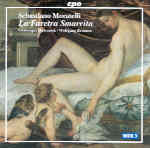This 50-minute serenata by the just-about-unknown Moratelli (1640-1706) is light entertainment. It is “about” Amor, who has misplaced his quiver (the title means “The Lost Quiver”). The god Mercury, narrating this tale, offers to help by asking Africa, Asia, Europe, and America if they’ve seen it. Unfortunately, not one personification of a continent has come across the quiver. Amor sings a lament and an echo-type voice says “Anna”, then “Arno”. Eventually the piece turns into a song of praise for Anna, a Medici, a woman so beautiful that she must have Cupid’s quiver. Or something like that.
The arias are brief and even the recitatives are tuneful. Most of the musical duties fall to Amor and Mercury, well sung by Verena Krause and Hermann Oswald–Oswald in particular has some pretty acrobatic music to perform. The other vocal roles are small, but the instrumentalists–solo oboe, recorder, trombone, and bassoon in addition to five strings–are highlighted, require some virtuosity, and call for real charm. The whole piece is a nice trifle: fluffy, melodic, and in its own diverting way, enchanting. An unknown bauble, worth knowing, well-performed, hardly crucial.
































